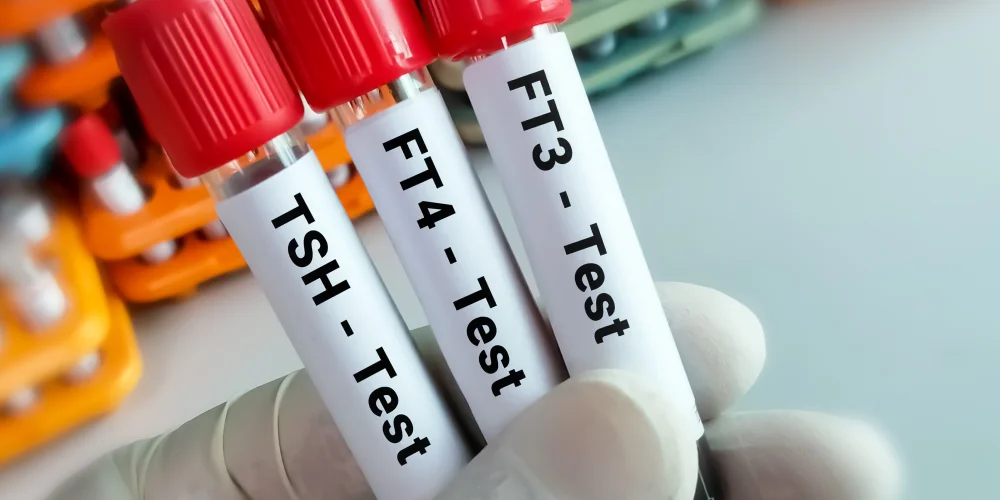FT3 FT4 TSH Test
Thyroid Hormones and Thyroid-Stimulating Hormone Levels
The FT3 FT4 TSH Test is a complete test that evaluates the thyroid function and to detect thyroid issues. FT3 (Free Triiodothyronine) and FT4 (Free Thyroxine) are hormones created through the thyroid gland and TSH (Thyroid Stimulating Hormone) is made from the pituitary gland and helps manage the production of these thyroid hormones. This test offers crucial information on how the thyroid gland performs helping in the identification and treatment of ailments such as hyperthyroidism and hypothyroidism and various thyroid-related conditions.

When is the FT3 FT4 TSH Test Prescribed?
The FT3, FT4, and TSH Test is used in different clinical situations:
- The symptoms of thyroid disorders : Examine the causes of symptoms like the loss of weight, fatigue and hair loss, heart pulses and mood swings that could indicate thyroid problems.
- Diagnostics of Thyroid Disorders : To diagnose conditions such as hypothyroidism (underactive thyroid) as well as hyperthyroidism (overactive thyroid).
- Monitor Thyroid Treatment : Patients receiving treatment for thyroid problems The test aids in monitoring the effectiveness of treatments and allows you to adjust the dosage of medications.
- Routine Health Check-ups : In the course of routine health screenings particularly for those who are at risk for thyroid problems due to their family background or any other reason.
- Pregnancy Monitoring and Pregnancy Prediction : To ensure optimal thyroid function. This is vital for the development of the fetus and the overall health of mothers.
Preparation for the FT3 FT4 TSH Test
A special test preparation is not usually needed for the FT3, FT4, and TSH Test. It is nevertheless important to notify your doctor of any supplements or medications that you take, since certain medicines can impact the levels of thyroid hormone and affect the results of tests. The practice of fasting isn’t usually necessary However, adhering to your doctor’s specific guidelines ensures that you get the most accurate results.
Parameters Considered During FT3 FT4 TSH Test
Test for FT3, FT4, and TSH FT3, FT4, and TSH Test is a test that measures the below parameters:
- FT3 (Free Triiodothyronine) : It is the active version of hormone triiodothyronine which is a reflection of thyroid activity.
- FT4 (Free Thyroxine) : Measures the free thyroxine hormone that can be found in bloodstreams, which indicates thyroid activity.
- TSH (Thyroid Stimulating Hormone) : Assesses the pituitary gland’s function in controlling the production of thyroid hormone.
These measurements provide a complete view of the health of your thyroid aiding healthcare professionals to diagnose thyroid problems and customize the treatment plan to be effective.
Time Required for FT3 FT4 TSH Test Report
A FT3, FT4, and TSH Test is a fairly simple process. When a blood sample is taken, results will be accessible within the next day. This speedy turnaround time permits health professionals to quickly assess thyroid function and suggest appropriate treatments, or any additional testing required.
Book an Appointment for FT3 FT4 TSH Test
Scheduling an appointment for your FT3, FT4, and TSH test at Chirayu Super Speciality Hospital in Bhayandar is simple and easy. Our pathology lab allows you to conveniently book your test via our online portal or by calling our department. We are committed to providing quick, prompt, and professional services to meet your healthcare requirements and ensure a smooth experience for our patients.
What Our Patients Say
Hear from our valued patients about their experiences at Chirayu Super Speciality Hospital and how our care has made a positive impact on their health and well-being.


Knowledgeable staff and seamless experience with Chirayu thyroid function tests.


The FT3, FT4, and TSH Test was crucial in diagnosing my chronic fatigue and weight issues.


Chirayu thyroid test revealed my imbalance, guiding necessary lifestyle and medication changes.


The comprehensive thyroid test at Chirayu was thorough, leading to an accurate diagnosis and effective treatment.


Accurate and timely results from the FT3, FT4, and TSH Test improved my thyroid health significantly.


Chirayu Hospital thyroid test panel provided clear insights, helping me manage my hypothyroidism effectively.
Frequently Asked Questions
Here, we provide answers to some of the most commonly asked questions to help you better understand our services, policies, and facilities. If you have any additional questions, please do not hesitate to contact us.
Normal ranges can vary slightly between laboratories, but generally, FT3 ranges from 2.0 to 4.4 pg/mL, FT4 ranges from 0.8 to 2.0 ng/dL, and TSH ranges from 0.4 to 4.0 mIU/L. Consult your healthcare provider for specific reference ranges.
Treatment depends on the type of thyroid disorder. Hypothyroidism is typically treated with synthetic thyroid hormone (levothyroxine), while hyperthyroidism may be managed with antithyroid medications, radioactive iodine, or surgery.
Yes, maintaining a balanced diet, managing stress, and avoiding iodine-deficient or excessive diets can help support thyroid health. Always discuss lifestyle changes with your healthcare provider.
The test involves a simple blood draw, which carries minimal risks such as slight bruising or discomfort at the puncture site.
The frequency depends on your health status and risk factors. Patients with known thyroid disorders may require regular monitoring, while others may need testing as part of routine health check-ups. Consult your healthcare provider for personalized advice.